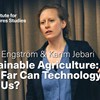efficiency
Mark Jaccard: Economic Efficiency vs Political Acceptability Trade-offs in GHG-reduction Policies
Mark Jaccard, Professor in the School of Resource and Environmental Management at Simon Fraser University, VancouverAbstractThere are obvious reasons why for three decades most jurisdictions have failPublic surveys and observation of real-world GHG reduction successes suggest that explicit carbon pricing (carbon tax and perhaps cap-and-trade) can be substantially more politically difficult than certain regulatory policies for shifting the energy system on to a deep decarbonization trajectory. Nonetheless, some people have argued that carbon pricing is an essential GHG reduction policy, suggesting that sincere politicians must do carbon pricing no matter how politically difficult. But the claim that carbon pricing is essential is factually incorrect. Deep decarbonization can be achieved entirely with regulations. Regulatory policies are unlikely to be as economically efficient as carbon pricing. But not all regulations perform identically when it comes to the economic-efficiency criterion. Flexible regulations have some attributes that make them low cost relative to regulations that require adoption of specific technologies.This talk provides evidence that assesses both the relative economic efficiency of policies and their relative political acceptability. The findings reported here suggest that some kinds of flexible regulations can perform significantly better than explicit carbon pricing in terms of relative political cost per tonne reduced while performing only marginally worse in terms of economic cost per tonne reduced. Presumably, this type of trade-off information could be of value to politicians who sincerely want deep decarbonization but would also like to be rewarded with re-election so that they and competing politicians see the value in ambitious and sustained GHG reduction efforts.
Sufficiency and the Distribution of Burdens
In: Mosquera, J. & O. Torpman (ed.), Studies on Climate Ethics and Future Generationsvol. 6. Working Paper Series 2024:10–17 Abstract A common objection to sufficientarianism is that it allows large
Are animals needed for food supply, efficient resource use, and sustainable cropping systems? An argumentation analysis regarding livestock farming
Food Ethics, vol. 9 Abstract It has been argued that livestock farming is necessary to feed a growing population, that it enables efficient use of land and biomass that would otherwise be lost from the
The study pace among college students before and after a student aid reform: some Swedish results
Abstract In 2001, the Swedish system of student aid for college students was substantially reformed; the grant-share of the total aid was increased, students were allowed to earn more without a reducti

Per Molander: Public vs. private healthcare in the OECD area – a broad evaluation of performance
Healthcare systems can be categorised along the public/private axis into two main types: publicly administered systems and systems based on compulsory health insurance provided by the private sector.
Per Molander: Public versus private healthcare systems in the OECD area – a broad evaluation of performance
Venue: Institute for Futures Studies, Holländargatan 13 in Stockholm or online Research seminar with Per Molander, PhD in control engineering and Bachelor's in mathematics, literature, etc. Throughout h
Per Krusell: The Role of Economic Analysis in Combatting Climate Change
Per Krusell, Professor of Economics at Stockholm University. Abstract The science is clear: Present global warming is caused by CO2 emissions from human activities. In order to avoid the big problems th
Government quality, egalitarianism, and attitudes to taxes and social spending: a European comparison
European Political Science Review, Vol 5 (2013), pp 363-80. First published online July 16, 2012, doi:10.1017/S175577391200015X. The paper analyses how perceptions of government quality – in terms of i
Disease prioritarianism: A Flawed Principle
Medicine, Health Care and Philosophy, May 2015. DOI 10.1007/s11019-015-9649-2 Disease prioritarianism is a principle that is often implicitly or explicitly employed in the realm of healthcare prioritiz

Karim Jebari & Emma Engström: Sustainable Agriculture - How Far Can Technology Take Us?
What would it take to have a sustainable world by the year 2100? In their research, philosopher Karim Jebari, and Emma Engström, PhD in technology, have analyzed a large set of potentially disruptive








